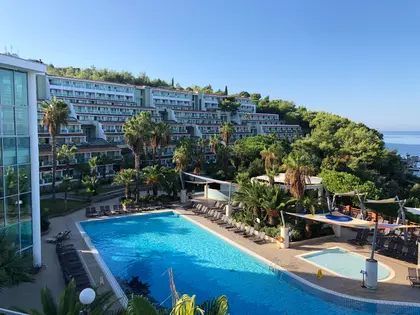Since the start of summer, more buses have appeared on Ukrainian roads leading to Moldova and Poland. The buses run between Ukrainian cities and airports in neighboring countries. Ukrainians who can afford it and who are free to leave the country, are keen to go on holiday to Greece or Turkey, where the sea is warm and where there is no gunfire or danger of missile attack.
There are fewer Ukrainian vacationers abroad this year than in pre-covid years, but they have become more demanding. Many Ukrainians planning to go to Turkey ask travel agencies to find them hotels where there are no Russians.
JOIN US ON TELEGRAM
Follow our coverage of the war on the @Kyivpost_official.
Last summer, resorts in Turkey saw many conflicts and even fights between Ukrainian and Russian vacationers. Russians often wear "Z" T-shirts or other symbols to show their support for the aggression against Ukraine and Putin. Many Ukrainians wear T-shirts bearing national symbols, such as the tryzub (trident), and often sport clothes in the yellow and blue colors of the Ukrainian flag.
In Turkey, a list of hotels and hotel chains which guarantee a “Russian-free vacation” has already appeared. They tend to be more expensive, five-star operations, which include the hotel chains of TUI BLUE, TUI MAGIC LIFE, and TT HOTELS. They have all announced that they no longer accept bookings from Russian tourists. The list of hotels "without Russians" is growing.
While the number of Russian tourists going abroad has also decreased due to the war and the worsening economic situation, local tourism is being widely advertised, for example, trips to Siberia and Lake Baikal. For Russians living in the Far East, China has entire resort towns ready to welcome their neighbors.

Putin Vows ‘Destruction’ on Ukraine After Kazan Drone Attack
This summer the Black Sea coast of the Russian North Caucasus is unlikely to boast an influx of vacationers. The only Russian Black Sea cruise liner "The Prince Vladimir" has canceled cruises scheduled for this summer which traditionally feature visits to Sevastopol and Yalta. Now it will only sail between the city of Sochi, where Putin's summer palace is located, and the region of Abkhazia seized from Georgia in 2008.
The majority of Russian tourists who want to relax on the Black Sea will go to Georgia, where it is both safer and cheaper. It seems the economic benefits from the influx of Russian tourists and “mobilization refugees” are too enticing for Georgians to ignore.
In the occupied territories of Ukraine, Mariupol, Novoazovsk, and other Azov Sea coastal towns, residents share beaches with the Russian military but prefer to relax away from hotels and resort complexes where Russian soldiers and officers are now billeted and which could be the target of Ukrainian rockets.
Life in the occupied territories has become strangely quiet, if not silent. After regular attacks on collaborators and the Russian military by Ukrainian partisans, teams of Russian intelligence officers have arrived in the regions to identify residents with pro-Ukrainian views. First of all, they focused on taxi drivers and ordered them to chat with their passengers so that they revealed their political views. The taxi drivers were supposed to denounce passengers who appeared dissatisfied with the occupation. In the occupied territories, taxi journeys now take place in silence.
Employees of the Russian special services also pay special attention to those residents of the occupied territories who do not want to take Russian citizenship. There are so many of them that Putin has signed a special decree allowing the deportation of Ukrainians from occupied territories if they refuse to take Russian citizenship.
It is true that plenty of Ukrainians have taken Russian passports. For men, the main drawback is that they can be drafted into the Russian army and sent to the front. Over the past year, among Russian soldiers captured by the Ukrainian forces, there is an increasing number of residents of eastern or south Ukraine. These Ukrainians in Russian military uniforms rarely want to return to the occupied territory via the prisoner-exchange scheme. That would mean a return to the front.
Ukrainian law recognizes that these men were issued with Russian passports illegally, and often under pressure. However, as citizens of Ukraine, if captured with weapons in their hands, they are traitors to their homeland and will either be charged with treason in Ukraine or exchanged for captured Ukrainian soldiers; a lose-lose situation for those involved, and certainly no one’s idea of a vacation.
You can also highlight the text and press Ctrl + Enter






